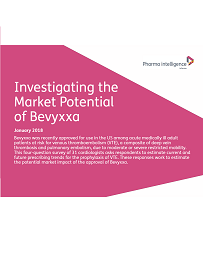Report Library
All Reports
Investigating the Market Potential of Bevyxxa
January 23, 2018
Bevyxxa was recently approved for use in the US among acute medically ill adult patients at risk for venous thromboembolism (VTE), a composite of deep vein thrombosis and pulmonary embolism, due to moderate or severe restricted mobility. This four-question survey of 31 cardiologists asks respondents to estimate current and future prescribing trends for the prophylaxis of VTE. These responses work to estimate the potential market impact of the approval of Bevyxxa.
Survey questions and additional resources are listed further below.
If you are a KOL Insight Subscriber, please access the survey from our KOL Insight portal
(Subscribers only).
Biomedtracker will be offering KOL Reports and Physician Pulse Surveys for purchase a la carte, or access to all reports and surveys
can be purchased as a subscription to KOL Insight. For more information on KOL Insight subscription, please email Biomedtracker or call
Biomedtracker
Client Services at (858) 200-2357.
For our disclosures, please read the Biomedtracker Research Standards.
Survey Questions:
- Screening question (part 1): Within the past month, how many patients hospitalized for an acute medical illness at risk for thromboembolic complications due to moderate or severe restricted mobility have you treated with VTE prophylaxis?
- Screening question (part 2): Have you heard of the recently FDA-approved novel oral anticoagulant (NOAC) Bevyxxa?
- Among your acute medically ill patients at risk for VTE due to moderate or severe restricted mobility, what percentage of patients do you currently prescribe each type of treatment?
- The primary endpoint under consideration was a significant reduction in rate of VTE and VTE death among patients with elevated D-dimer levels. Bevyxxa failed to reach statistical significance among this cohort (p=0.054), but reached statistical significance for two secondary endpoints. Despite failing to meet the primary endpoint in the APEX trial, Bevyxxa was approved for use due to the positive results in the secondary endpoints. How likely are you to prescribe Bevyxxa after viewing the data below?
- Does Bevyxxa being approved for use in both hospital and out-patient settings provide the medication an advantage as compared to other therapies used for prophylaxis of VTE?
- Among your acute medically ill patients at risk for VTE due to moderate or severe restricted mobility, two years from now, what percentage of patients do you anticipate prescribing each type of treatment?
| Indications Covered: | Venous Thromboembolism (VTE) |
